by M. C. Jennings | Oct 20, 2022 | Academics, Accounting, Alumni Spotlight, COBA Faculty, COBA Staff, Current Students, Digital Entertainment Technology, Financial Management, Human Resource Management, Management, Management Information Systems, Marketing, Placement stories, Professional Development, School of Information Technology and Computing, Uncategorized
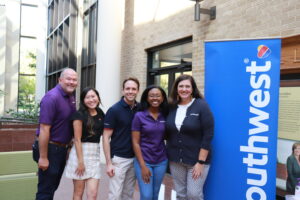
COBA Alums who work at Southwest Airlines recently came to discuss internship opportunities at the company with COBA students. Pictured from left to right are Chris Grubbs (’95), Kristy Ng (’20), Baron Smith (’09), Bethani Culpepper (’19), and Katie Coldwell (’00).
Written by special contributor Lance Fleming
When the College of Business Administration (COBA) unveiled the most significant changes to its curricula in decades, one area of great emphasis was professional development. Those studying the updates and later making the recommendations believed a professional internship would help make COBA students more well-rounded prospective employees when they left ACU.
As Dr. Brad Crisp, the Dean of the College of Business Administration said recently, “… we are placing greater emphasis on professional development by requiring a professional internship in management, marketing, and information systems and offering an internship as an option for accounting and finance majors.”
As the person serving as the director of professional development and internships for COBA, Jasmine McCabe-Gossett said the new emphasis on internships will help make students better equipped to handle real-world practices that they will face when they begin working full-time.
“Students need to take advantage of the unique timing internships can offer,” said McCabe-Gossett, who is in her first year as the Professional Development and Internship Director for COBA. “Students have the distinct opportunity to apply what can feel like abstract theories and case studies to the real world. Internships are insulated and allow students to practice in an environment designed for them to ask questions and fail, whereas, post-graduate opportunities can be far less forgiving.”
first year as the Professional Development and Internship Director for COBA. “Students have the distinct opportunity to apply what can feel like abstract theories and case studies to the real world. Internships are insulated and allow students to practice in an environment designed for them to ask questions and fail, whereas, post-graduate opportunities can be far less forgiving.”
Tim Johnston, the Assistant Dean for COBA, said a student who participates in an internship program in college will have a distinct advantage over students who don’t take advantage of those programs.
“Many years ago, with the contraction of the economy, many students were entering college without a lot of summer work experience,” Johnston said. “One of the top qualities all employers like to access is work ethic. Without a lot of work experience, it was difficult to feel confident about a student’s ability to dig-in and work hard. Many large organizations started internship programs.
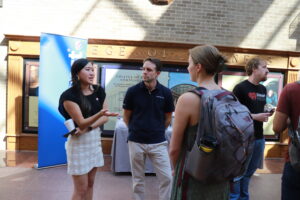
“These programs typically run for 12 weeks during the summer,” he said. “Most are paid and it’s a way for a company to have a long and intense look at the candidates. Many companies only offer full-time opportunities to those students who have completed an internship with their organization. So for many large firms, this is the path into their company.”
When a student is looking for an internship, COBA Associate Dean Andy Little said one thing stands above all when he advises a student on a potential position.
“Fit,” he said succinctly. “In other words, does this organization fit your values and the goals you have set for yourself? Will you get practical experience? What kind of people work there? Is it an industry or market segment that you would like to start your career in?”
McCabe-Gossett agrees that finding an internship in a potential career field is an essential part of finding the right landing spot.
“I encourage students to focus on finding an internship in the industry they imagine as their future career,” she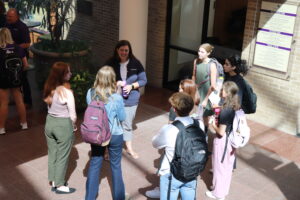 said. “Doing so will allow them to fully immerse themselves so they can determine whether or not their dream industry aligns with their values, work style, etc.”
said. “Doing so will allow them to fully immerse themselves so they can determine whether or not their dream industry aligns with their values, work style, etc.”
The National Association of Colleges and Employers has surveyed employers and determined the following qualities are most important to the potential employers surveyed. In order of importance, those qualities are:
- Problem-solving (critical thinking)
- Teamwork / collaboration
- Professionalism / work ethic
- Verbal and written communication skills
- Digital technology capabilities
- Leadership
- Global / multicultural fluency
“We want our students to demonstrate these competencies and reflect on their current areas of strength and areas where growth is needed,” Johnston said. “Their internship manager completes a formal evaluation that provides feedback on these key qualities.
“Another key advantage we are looking to provide for ACU students is an opportunity to intern with ACU alumni,” he said. “Our alumni teach students how professional excellence provides another avenue to honor God, as we serve in the marketplace.”
If you’d like to know more about internships with COBA, as either an employer or a student, email coba@acu.edu.
by M. C. Jennings | Oct 12, 2022 | Academics, Accounting, COBA Faculty, College Decisions, Current Students, Economics, Faith Infusion, Financial Management, Human Resource Management, International Business, Management, Management Information Systems, Marketing, Professional Development, Uncategorized
Written by special contributor Lance Fleming
The College of Business Administration (COBA) recently undertook what Dr. Brad Crisp considers “the most significant change to business curricula at ACU in at least three decades” with revisions to the Bachelor of Business Administration (BBA) majors.
significant change to business curricula at ACU in at least three decades” with revisions to the Bachelor of Business Administration (BBA) majors.
Those changes include updates to the core requirements for all business majors and to the major requirements for each business major, including an analytics track available within each major. The process that was undertaken was extensive and lasted a few years, including input from the COBA Dean’s Council, Visiting Committees, and other external stakeholders.
The members of each of those committees and groups were looking at in-depth benchmarking, analysis, and solution alternatives identified by the BBA Task Force. Those committees undertook extensive discussions on a wide range of proposals from the faculty task force, which was formed in early 2019 and delivered its recommendations later that fall. After the committees did their work, the changes were approved last spring by faculty and administrators at all levels of the university.
The goal of the core revision largely focused on faith and ethics, analytics and technology, and professional development.
“Faith and ethics are central to our identity as a Christian university,” said Dr. Crisp, the Dean of the College of Business Administration, “and we added some ethics content to a required business law course. All business majors will now take a two-course sequence in analytics and can choose a nine-hour or more track in analytics. Finally, we are placing greater emphasis on professional development by requiring a professional internship in management, marketing, and information systems and offering an internship as an option for accounting and finance majors.”

Photo by Jeremy Enlow
Those recommendations and changes are part of COBA keeping up with the pace of change that is currently being seen in the business world, said Andy Little, associate dean for COBA and associate professor of Business Law.
“The pace of change in the business world – and society in general – necessitates some level of change in two dimensions: first within a specific course, faculty need to stay up to date with new developments; and second, from time to time, the curriculum in general needs to be evaluated and potentially updated,” Little said. “It’s easy for most faculty to update specific courses on a regular basis. I’ve added three new readings to my introductory law class, all of which deal with recent developments in the legislature.
“Maybe more clearly, a course like Digital Marketing requires near-constant revision, just to keep up with all the changes in how people and companies use platforms to market products and services,” he said. “To a certain extent, the velocity of change works in favor of a stable curriculum: foundational subjects like Accounting, Economics, and Statistics need to be included in every iteration of a core curriculum over time because those are the building blocks on which much of the business enterprise rests.”
Every major was reviewed and now has more market aligned pathways giving students more direction and professional guidance as they look toward their future profession. As the business world evolves, COBA is continually looking for ways to prepare students both inside and outside of the classroom. We do this through holistic student development, offering foundational business courses and major specific tracks, and including ethics in our offerings. This combination helps us strive to produce graduates who honor God and bless the world.
To learn more about the College of Business at ACU, click here.
by M. C. Jennings | Sep 28, 2022 | Academics, Alumni Spotlight, COBA Events, COBA Faculty, COBA Staff, Current Students, Faith Infusion, Uncategorized
Written by special contributor Lance Fleming
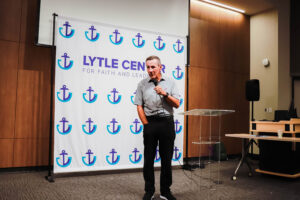 In more than 30 years as the minister at The Hills Church in North Richland Hills, Rick Atchley (’78) has delivered thousands of sermons to millions of people, drawing listeners from near and far to a relationship with Jesus Christ. In Atchley’s tenure with The Hills Church, it has grown to be among the largest Church of Christ congregations in the world, averaging over 5,000 in attendance each week across three campuses.
In more than 30 years as the minister at The Hills Church in North Richland Hills, Rick Atchley (’78) has delivered thousands of sermons to millions of people, drawing listeners from near and far to a relationship with Jesus Christ. In Atchley’s tenure with The Hills Church, it has grown to be among the largest Church of Christ congregations in the world, averaging over 5,000 in attendance each week across three campuses.
As he said when he was named ACU’s Outstanding Alumnus of the Year in 2014, one of the themes of his life and his ministry is to live out Christ’s call to unify and to “bring down walls that God didn’t want up in the first place.”
Atchley spoke to both students and faculty and staff at ACU on Tuesday, September 6th. His address to students was a part of the Lytle Center’s Fall Speaker Series while his exhortation to faculty and staff was a part of the Lytle Center’s second annual Abiding in Christ dinner event. The Abiding in Christ dinner was established in 2021 with a vision of encouraging and challenging faculty and staff in the deepening of their relationships with Jesus in order to better influence and serve students. It should come as no surprise that Atchley had a challenge for each group. A mission to follow Christ no matter the setting or circumstances.
students was a part of the Lytle Center’s Fall Speaker Series while his exhortation to faculty and staff was a part of the Lytle Center’s second annual Abiding in Christ dinner event. The Abiding in Christ dinner was established in 2021 with a vision of encouraging and challenging faculty and staff in the deepening of their relationships with Jesus in order to better influence and serve students. It should come as no surprise that Atchley had a challenge for each group. A mission to follow Christ no matter the setting or circumstances.
At the Abiding in Christ dinner, Atchley contended, that ACU should be a place where students attend to not only grow in academic ability but also in wisdom.
“We know there’s a difference between being intelligent and truly being wise, and that’s why I believe the mission of this university is so critical,” he said to a group of around 200 faculty and staff members gathered in the Brown Family Club Level at Anthony Field at Wildcat Stadium. “Let’s be honest: young people don’t have to come to ACU to gain knowledge on how to be an accountant or how to manage the market. They can gain knowledge at many great universities. What I hope for when they come here is that, along with knowledge, they gain wisdom. They learn to be wise, not just smart.”
Atchley then spent several minutes challenging those in attendance to teach their students to look for wisdom and guidance from above and not from other sources.
“What is the wisdom of the world?” he asked. “It’s the knowledge that looks for truth from within instead of above. It’s the Kool-Aid of this culture. The young people you teach have been immersed in it. It’s all about finding their truth. The world has told them to look inside to find truth.”
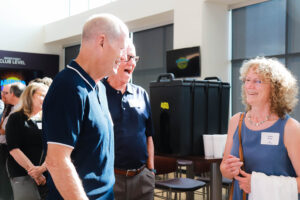 “They don’t have to come here to get knowledge; you’re good at that,” Atchley told the crowd. “You’re good at that. But when they leave with the knowledge you’ve given them, will they be wiser? Will they leave with a worldview that says ‘I’m going to look at life through the lens of the wisdom of Christ? He will be where I get my truth. He will be the framework from which I understand what is right and wrong.’ Will they leave with wisdom, not just knowledge?”
“They don’t have to come here to get knowledge; you’re good at that,” Atchley told the crowd. “You’re good at that. But when they leave with the knowledge you’ve given them, will they be wiser? Will they leave with a worldview that says ‘I’m going to look at life through the lens of the wisdom of Christ? He will be where I get my truth. He will be the framework from which I understand what is right and wrong.’ Will they leave with wisdom, not just knowledge?”
Late in his address to the faculty and staff, Atchley reminded them that they are working and teaching in a society that has been battered by the constant battle between politics and religion. And it’s against that backdrop that ACU faculty and staff must equip students with the wisdom needed to traverse that world, no matter their chosen profession.
“For the Christian educator, the opportunity to prepare students for the world in which they will pursue varied and creative careers must include the role of faith and the pursuit of wisdom,” said Mitzi Adams, Director of Clinical Teaching and Field Experiences in the Department of Teacher Education. “We are challenged to consider how our courses are different from the courses offered at other prestigious universities where students could secure a solid education. At ACU, it must come back to the witness of faith.”
“I think it’s very important for students to hear and experience much more than just knowledge of their field of study,” she said. “At a Christian university, the faith we profess becomes the framework through which we view and experience this education.”
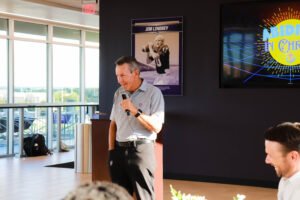 As Atchley pointed out numerous times to the faculty and staff, the prevailing mission of ACU should be to not only equip students with knowledge and wisdom but also the desire to live out their faith in the world around them.
As Atchley pointed out numerous times to the faculty and staff, the prevailing mission of ACU should be to not only equip students with knowledge and wisdom but also the desire to live out their faith in the world around them.
“For a student to walk away from this Christian university without the opportunity to understand and apply where and how faith integrates into their chosen field of study is to have had an important aspect of this education withheld,” Adams said. “If not now, when will our students have the opportunity to be immersed in studies intended to prepare them for excellence in their field? Beyond this, at what other time in the lives of our students will they have the opportunity to be taught by exceptional practitioners, academics, and researchers who are compelled by the Christian faith? Our students are here now. This is an opportunity we have as a faculty to pour into our students not only our professional expertise but also the centering of our faith.”
Before Atchley spoke to the faculty and staff at the football stadium, he met with COBA students, challenging them to choose the battles that matter.
“It’s easy to get passionate and carried away with matters that don’t have much weight,” said Kathryn Crawford, a senior Finance and Management major from Flower Mound. “Instead, we need to recognize the fights that will have an impactful outcome and approach those with our chosen values.”
In addition, his theme with the students was much the same as it would be later with the faculty and staff: that knowledge is easily attainable anywhere but it’s wisdom and obedience in Christ that will make the most impact on the world.
“He made the point that we have to trust the impact of an obedient life,” Crawford said of Atchley. “When things become difficult, the easy way out seems so attractive. But this path does not guarantee obedience. Time and time again, scripture shows us our convictions will cause us to face difficult things in our lives. Choosing obedience may not be easy but the impact we can unknowingly have on the Kingdom is far greater than the temporary adversity we might face.”
Crawford said Atchley’s message to students about integrity and faith in the workplace resonated with her because he put special emphasis on how important the choice will be.
“As a student at a Christian university, it becomes easy to rely on circumstances and surroundings to motivate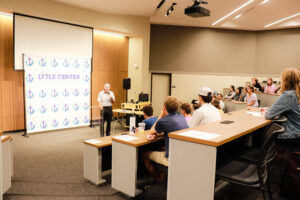 my faith,” she said. “However, I know this won’t necessarily be the case when I emerge into the workforce as a young professional. I value my faith deeply but have not been in many environments that challenge or counter my beliefs. I left the message feeling encouraged to stay true to my values regardless of circumstance and recognize how much of a difference it can truly make if I choose to let it.”
my faith,” she said. “However, I know this won’t necessarily be the case when I emerge into the workforce as a young professional. I value my faith deeply but have not been in many environments that challenge or counter my beliefs. I left the message feeling encouraged to stay true to my values regardless of circumstance and recognize how much of a difference it can truly make if I choose to let it.”
The Lytle Center for Faith and Leadership exists to foster environments for individuals to grow in faith and character, equipping them with cutting edge leadership competencies, and developing them to be ambassadors of hope, peace, and life in their workplaces. The Lytle Center Speaker Series and the annual Abiding in Christ dinner events are just one example of the ways the Lytle Center strives to encourage and equip the students, faculty, and staff at Abilene Christian University. More information about the Lytle Center can be found by clicking here.
by M. C. Jennings | Sep 14, 2022 | Academics, Alumni Spotlight, Careers In..., City of Abilene, COBA Staff, Faith Infusion, Professional Development, Uncategorized
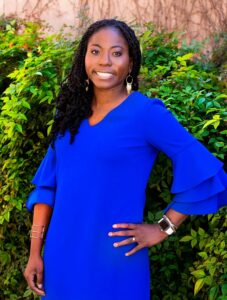
Written by special contributor Lance Fleming
It hasn’t taken long for Regi and Jasmine McCabe-Gossett to ingrain themselves into the community of Abilene. The two ACU graduates – Regi in 2009 and Jasmine in 2010 – have become a vital part of the fabric of the city, each serving on boards and committees to help direct the future of Abilene, and each helping charities, foundations, and businesses in the city raise money.
Yet despite having spent the last three-plus years as the Donor Services Director for the Community Foundation of Abilene, something was drawing Jasmine back “home” to ACU. And that draw is why she returned to campus this summer, leaving the Community Foundation to become the new Professional Development and Internship Director in the College of Business Administration.
“I’ve always had a connection to ACU; it’s where I earned my undergraduate degree, where I met the love of my life, and where I started my professional career,” she said. “Over the years, my involvement with COBA has continued to grow and evolve having served as a guest speaker, sat on the COBA Alumni Visiting Committee, and even teaching classes as an adjunct professor. Working with and teaching students has always been a sweet spot for me.”
But it wasn’t until she was in the process of interviewing for the new role that she truly understood that she was being called back to ACU.
“During the interview process, I unearthed Welcome Week pictures from my freshman year and felt a rush of emotions,” Jasmine said. “There were so many amazing experiences during my time at ACU that ultimately impacted the trajectory of my professional career.”
“I am forever grateful to those that invested their time in me sharing candid advice, empowering me to think outside of the box, and inspiring me to explore a career I never knew existed,” she said. “I am excited to serve and share key insights with COBA students as they prepare for this next season of their professional lives.”
And so, she finds herself back on campus, back in the building where she worked toward her Bachelor of Business Administration in Human Resources Management, and back where she launched a career that has seen her go from Workforce Solutions of West Central Texas to Hendrick Medical Center to Encompass Health Rehabilitation Hospital to the Community Foundation. Each of those stops – where she’s done everything from human resources to writing business service plans to the creation of leadership and development programs to helping raise millions of dollars – has helped shape who she is as she begins her work at ACU.
At ACU, she will be executing the professional development program, directing all aspects of the internship program, and will serve as a member of the Holistic Student Development Team. She’ll truly be helping shape the futures of students each year.
“This job is truly the convergence of all the things I am passionate about: building relationships, coaching, mentoring, and teaching,” Jasmine said. “I’m looking forward to helping center COBA as an epicenter for top new graduate talent. I am also looking forward to building a pipeline for COBA alumni to connect with and mentor undergraduate students.”
“I can certainly attribute much of my career success to those that came before me and made a concerted effort to pay it forward,” she said. “I’m looking forward to the ripple effect that will continue after students graduate from COBA.”
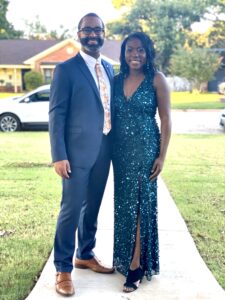 Neither she nor her husband, Regi, are from Abilene. However, they decided to stay in the city after graduating from ACU and have taken their love of the community and turned themselves into a powerful team. Jasmine currently serves on eight boards, while Regi has served on six boards and in 2020 was named one of Abilene’s Top 20 Under 40.
Neither she nor her husband, Regi, are from Abilene. However, they decided to stay in the city after graduating from ACU and have taken their love of the community and turned themselves into a powerful team. Jasmine currently serves on eight boards, while Regi has served on six boards and in 2020 was named one of Abilene’s Top 20 Under 40.
“The decision we made to put down roots here has been both motivating and rewarding,” Jasmine said. “Serving on nonprofit boards, in our church, etc., allows us to actively contribute to the exciting changes we want to see. We are honored to serve however we can.”
And it’s that heart for service and the love of building key connections that Jasmine hopes to pass on to the students she’ll be guiding at ACU.
“Much of my career has centered on building key connections both in the community and within organizations,” Jasmine said. “I’ve had the opportunity to both connect employee candidates to career opportunities they desire and philanthropists to community causes they are passionate about. Maintaining this theme of connection, the intersection of my experiences will allow me to connect students to career opportunities while also sharing key insights with students eager to learn how to authentically live out their faith in the workplace and beyond.”
Jasmine said. “I’ve had the opportunity to both connect employee candidates to career opportunities they desire and philanthropists to community causes they are passionate about. Maintaining this theme of connection, the intersection of my experiences will allow me to connect students to career opportunities while also sharing key insights with students eager to learn how to authentically live out their faith in the workplace and beyond.”
COBA is excited to have Jasmine at the professional development helm. To learn more about the College of Business Administration and professional development, click here.
by M. C. Jennings | Sep 6, 2022 | Academics, COBA Faculty, College Decisions, Faculty Testimonials, Faith Infusion, Management Information Systems, Uncategorized
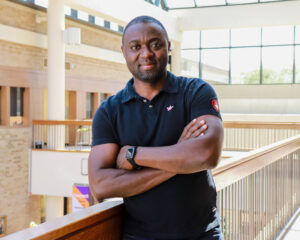 Written by special contributor Lance Fleming
Written by special contributor Lance Fleming
Growing up in Cameroon as the oldest child in a family of five, Dr. Joseph Manga never imagined where his life would take him.
Four different universities for undergraduate, graduate, and doctoral work, as well as tutoring and teaching experience, have all been part of the experience. And this past summer, it led him to Abilene Christian University and the College of Business Administration where he is teaching Management Information Systems.
Manga now joins the full-time faculty as a tenure-track assistant professor of Information
Systems and Management Science. None of this was what Manga expected to be his life’s work
while living in Cameroon. But as he would come to learn, God had other plans for his life.
“As we know, many may be the plans in a man’s heart, but the Lord determines the end,” he
continued. “I began with Mathematics, did a little bit of Computer Science, and then moved on
to business (MIS). This all worked out because I didn’t just want to be crunching numbers and
not know how to interpret them. So, I developed my love for learning from my personal
experience. As an introvert, I thought that doing something that would keep me from talking to
people would be great. That’s why I’m so passionate about research. That was all my plan. But
God’s plan was to send me to love and talk to people.”
Knowing all of that, it still took a chance conversation with a friend that pointed him toward
teaching and meeting the needs of young people.
“I vividly remember sometime in 1998 a friend walked up to me and said, ‘I see you as a
teacher,’ “ Manga said. “I didn’t want to hear that because I never wanted to teach, partly
because of my personality. But as I applied myself to learning, I realized there is more to
teaching than just transferring knowledge. It involves mentoring and discipleship, which are
godly assignments that we are called to fulfill. I believe that teaching brings transformation to
many when it is done in a godly way. That’s why I’m excited to be part of a family and
community that focus on raising a holistic generation in terms of spiritual academic formation,
who will, in turn, move on to serve and transform their world.”
He’s also motivated by the memory of his father, who passed away last January. Manga is the
first person in his family to attain a doctorate, and he attributes his decision to reach the
highest level of education to his father, who worked as a janitor at the university Manga
attended in Cameroon.
“My dad was a strong motivator and proponent for pursuing education, which is a passion for
me now – to see young people educated,” Manga said. “As a janitor, my dad would wake up
very early to go clean the classrooms before students started classes. I still remember one
instance when my dad’s supervisor verbally demeaned him, and I felt bad. But I decided to get
to the highest level of education and use it to honor the janitors who keep our work
environment clean. It was an awful life experience, but it served as a challenge to the
educational experience I have today, which I see as a blessing.”
Manga earned his Bachelor of Science from the University of Buea in Cameroon before earning a
Master’s of Business Administration from Midwestern State University in 2014, a Master of
Science in Management Information Systems from the University of North Texas in 2018, and
finally his Ph.D., in Business Administration from the University of Texas-Rio Grande Valley in
2022.
During all of his academic work, Manga has continued his research in several different areas of
management information systems, technology, information security policy compliance,
business analytics, health information technology, cyber security, and many others.
“Research is a passion,” Manga said. It’s one way to apply my background knowledge in
Mathematics, which is problem-solving. Identifying problems and looking for ways to provide
solutions to these problems is what drives me into research. Finally, I see research as making a
little contribution to academia and giving back to the community.”
Manga has also worked as a Men’s Ministry Coordinator at Abundant Grace Community Church
in Edinburg and as a tutor while in Wichita Falls. And he’s kept up with a family that includes
wife Clarise and four children: Abijoy (9), Solien-Pearl (6), Zoe-Ann (5), and Joe-Praise (4), all of
whom he calls “inquisitive disciples.”
And now the family of six has found its way to Abilene and ACU where Manga is ready and
willing to serve as God leads.
“I am passionate to serve, especially in an environment that aligns with one’s beliefs and
values,” he said. “When the opportunity opened to be part of a culture and institution that
trains godly business leaders in whatever capacity they find themselves, I was glad to jump on
it. God opened this door and I love to follow His lead.”
by M. C. Jennings | Aug 31, 2022 | Academics, Current Students, Digital Entertainment Technology, Faith Infusion, School of Information Technology and Computing, Student Spotlights, Uncategorized
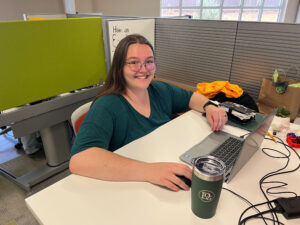 Written by special contributor Lance Fleming
Written by special contributor Lance Fleming
In most places of business, an apprentice is given a few days or even a week to get their feet wet and learn the ins and outs of the office before being fully indoctrinated into the ins and outs of the everyday job.
Alissa Davis didn’t have that luxury.
When Davis – who is pursuing her Bachelor of Science in Digital Entertainment Technology (DET) with an emphasis on Video Game Design and is on target to graduate in May 2023 – started her apprenticeship with Funeral Director’s Life Insurance Company on June 1, she had no choice but to get right to work and help her co-workers make it through one of the saddest moments in the recent history of the country.
Just one week before she began, 19 students and two teachers at Robb Elementary School in Uvalde lost their lives to a mass shooter. When Davis began her apprenticeship, she was immediately charged with helping to set up and monitor live streams of approximately 15 of the funerals that stretched over several days.
It was a tough and emotional task and one that Davis hasn’t fully put into perspective.
“I still haven’t fully processed the emotions that came with it,” said Davis, who is a senior from Stephenville. “There were several times during the services when I had to completely turn the sound off and momentarily step away from my desk where I was monitoring the live stream because I couldn’t handle the sound of the parents grieving for their lost children. There was always a tense aura in the department because we needed to do better than our best and ensure that everything went as smoothly as possible for those families and the community, who suffered great losses.”
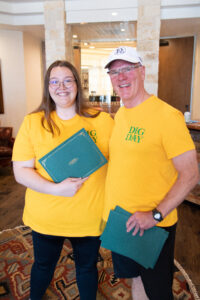 Around July 1 when her boss returned from Uvalde, Davis was assigned a new responsibility to create short training videos for both new and regular clients to watch and learn how to use the FDLIC streaming product. Despite the difficult and emotional circumstances, Davis had quickly made a name for herself at the company. So much so that at the end of her apprenticeship, Davis was awarded the Performance Plus Award, which is awarded by the FDLIC’s Board of Directors and had never before been presented to an apprentice.
Around July 1 when her boss returned from Uvalde, Davis was assigned a new responsibility to create short training videos for both new and regular clients to watch and learn how to use the FDLIC streaming product. Despite the difficult and emotional circumstances, Davis had quickly made a name for herself at the company. So much so that at the end of her apprenticeship, Davis was awarded the Performance Plus Award, which is awarded by the FDLIC’s Board of Directors and had never before been presented to an apprentice.
The award is given to an employee who shows outstanding qualities that fit several of the 22 non-negotiable traits of the company. Normally, the person who receives the award is recognized by another respected employee of the company and awarded at a company-wide meeting at the end of the month. However, Davis’s above-and-beyond effort resulted in her receiving this remarkable reward.
“I was stunned,” Davis said of the moment when she was announced as the winner of the award. “I knew that I helped the team, but I discredited myself as able to receive praise because I never went there personally or interacted with the people in person as the rest of the team did. So, when it came time to recognize the winners, I was completely stunned to see my name there.”
By the end of her second week, Davis said, she was fully trained and up to speed on almost everything a normal employee in the FDLIC Encore Department would know. The Encore Department is the technology used to live-stream funeral services.
“I had to quickly learn how to do so much more than an ordinary apprentice should in less than one week,” Davis said. “By my third day, I took on responsibilities as if I was another full-time employee because I wanted to do anything I could to help make the lives of my bosses and co-workers easier. They needed to put their focus and full attention on the devastating matter at hand and give the funeral directors on site their undivided attention and assistance.”
Davis – who said the greatest lesson she learned during her apprenticeship is that it’s OK to make mistakes –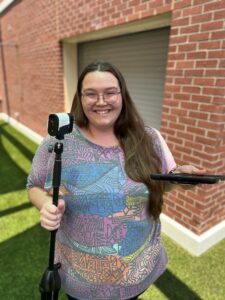 was on the job for two months and will have a full-time job waiting for her when she graduates. In the meantime, she was offered a part-time job when the apprenticeship was over and she’s currently working in that job until she can begin her full-time job. And after some time there, her goal is to pursue a career with her DET degree because her true passion is video game design.
was on the job for two months and will have a full-time job waiting for her when she graduates. In the meantime, she was offered a part-time job when the apprenticeship was over and she’s currently working in that job until she can begin her full-time job. And after some time there, her goal is to pursue a career with her DET degree because her true passion is video game design.
She credited ACU and COBA with getting the apprenticeship and learning to use her imagination to be as creative as possible.
“ACU had the connections for me; I would not have learned about this internship in the first place without them,” Davis said. “Being at ACU has helped me come out of my shell, so I can take the leaps of faith and go for something I want. My time at ACU has also taught me to think quickly on my feet so that I can learn how to do what I need to do quickly to be able to give back to and help others.
“The best thing about being a COBA student is having the opportunity for freedom to create whatever I can imagine,” she continued. “And if I can’t do it because I lack the skill, I have friends and professors around me who can and are actively willing to help because want to see me succeed.”

 first year as the Professional Development and Internship Director for COBA. “Students have the distinct opportunity to apply what can feel like abstract theories and case studies to the real world. Internships are insulated and allow students to practice in an environment designed for them to ask questions and fail, whereas, post-graduate opportunities can be far less forgiving.”
first year as the Professional Development and Internship Director for COBA. “Students have the distinct opportunity to apply what can feel like abstract theories and case studies to the real world. Internships are insulated and allow students to practice in an environment designed for them to ask questions and fail, whereas, post-graduate opportunities can be far less forgiving.”
 said. “Doing so will allow them to fully immerse themselves so they can determine whether or not their dream industry aligns with their values, work style, etc.”
said. “Doing so will allow them to fully immerse themselves so they can determine whether or not their dream industry aligns with their values, work style, etc.” significant change to business curricula at ACU in at least three decades” with revisions to the Bachelor of Business Administration (BBA) majors.
significant change to business curricula at ACU in at least three decades” with revisions to the Bachelor of Business Administration (BBA) majors.
 In more than 30 years as the minister at The Hills Church in North Richland Hills, Rick Atchley (’78) has delivered thousands of sermons to millions of people, drawing listeners from near and far to a relationship with Jesus Christ. In Atchley’s tenure with The Hills Church, it has grown to be among the largest Church of Christ congregations in the world, averaging over 5,000 in attendance each week across three campuses.
In more than 30 years as the minister at The Hills Church in North Richland Hills, Rick Atchley (’78) has delivered thousands of sermons to millions of people, drawing listeners from near and far to a relationship with Jesus Christ. In Atchley’s tenure with The Hills Church, it has grown to be among the largest Church of Christ congregations in the world, averaging over 5,000 in attendance each week across three campuses. students was a part of the Lytle Center’s Fall Speaker Series while his exhortation to faculty and staff was a part of the Lytle Center’s second annual Abiding in Christ dinner event. The Abiding in Christ dinner was established in 2021 with a vision of encouraging and challenging faculty and staff in the deepening of their relationships with Jesus in order to better influence and serve students. It should come as no surprise that Atchley had a challenge for each group. A mission to follow Christ no matter the setting or circumstances.
students was a part of the Lytle Center’s Fall Speaker Series while his exhortation to faculty and staff was a part of the Lytle Center’s second annual Abiding in Christ dinner event. The Abiding in Christ dinner was established in 2021 with a vision of encouraging and challenging faculty and staff in the deepening of their relationships with Jesus in order to better influence and serve students. It should come as no surprise that Atchley had a challenge for each group. A mission to follow Christ no matter the setting or circumstances. “They don’t have to come here to get knowledge; you’re good at that,” Atchley told the crowd. “You’re good at that. But when they leave with the knowledge you’ve given them, will they be wiser? Will they leave with a worldview that says ‘I’m going to look at life through the lens of the wisdom of Christ? He will be where I get my truth. He will be the framework from which I understand what is right and wrong.’ Will they leave with wisdom, not just knowledge?”
“They don’t have to come here to get knowledge; you’re good at that,” Atchley told the crowd. “You’re good at that. But when they leave with the knowledge you’ve given them, will they be wiser? Will they leave with a worldview that says ‘I’m going to look at life through the lens of the wisdom of Christ? He will be where I get my truth. He will be the framework from which I understand what is right and wrong.’ Will they leave with wisdom, not just knowledge?” As Atchley pointed out numerous times to the faculty and staff, the prevailing mission of ACU should be to not only equip students with knowledge and wisdom but also the desire to live out their faith in the world around them.
As Atchley pointed out numerous times to the faculty and staff, the prevailing mission of ACU should be to not only equip students with knowledge and wisdom but also the desire to live out their faith in the world around them. my faith,” she said. “However, I know this won’t necessarily be the case when I emerge into the workforce as a young professional. I value my faith deeply but have not been in many environments that challenge or counter my beliefs. I left the message feeling encouraged to stay true to my values regardless of circumstance and recognize how much of a difference it can truly make if I choose to let it.”
my faith,” she said. “However, I know this won’t necessarily be the case when I emerge into the workforce as a young professional. I value my faith deeply but have not been in many environments that challenge or counter my beliefs. I left the message feeling encouraged to stay true to my values regardless of circumstance and recognize how much of a difference it can truly make if I choose to let it.”
 Neither she nor her husband, Regi, are from Abilene. However, they decided to stay in the city after graduating from ACU and have taken their love of the community and turned themselves into a powerful team. Jasmine currently serves on eight boards, while Regi has served on six boards and in 2020 was named one of Abilene’s Top 20 Under 40.
Neither she nor her husband, Regi, are from Abilene. However, they decided to stay in the city after graduating from ACU and have taken their love of the community and turned themselves into a powerful team. Jasmine currently serves on eight boards, while Regi has served on six boards and in 2020 was named one of Abilene’s Top 20 Under 40. Jasmine said. “I’ve had the opportunity to both connect employee candidates to career opportunities they desire and philanthropists to community causes they are passionate about. Maintaining this theme of connection, the intersection of my experiences will allow me to connect students to career opportunities while also sharing key insights with students eager to learn how to authentically live out their faith in the workplace and beyond.”
Jasmine said. “I’ve had the opportunity to both connect employee candidates to career opportunities they desire and philanthropists to community causes they are passionate about. Maintaining this theme of connection, the intersection of my experiences will allow me to connect students to career opportunities while also sharing key insights with students eager to learn how to authentically live out their faith in the workplace and beyond.” Written by special contributor Lance Fleming
Written by special contributor Lance Fleming Written by special contributor Lance Fleming
Written by special contributor Lance Fleming Around July 1 when her boss returned from Uvalde, Davis was assigned a new responsibility to create short training videos for both new and regular clients to watch and learn how to use the FDLIC streaming product. Despite the difficult and emotional circumstances, Davis had quickly made a name for herself at the company. So much so that at the end of her apprenticeship, Davis was awarded the Performance Plus Award, which is awarded by the FDLIC’s Board of Directors and had never before been presented to an apprentice.
Around July 1 when her boss returned from Uvalde, Davis was assigned a new responsibility to create short training videos for both new and regular clients to watch and learn how to use the FDLIC streaming product. Despite the difficult and emotional circumstances, Davis had quickly made a name for herself at the company. So much so that at the end of her apprenticeship, Davis was awarded the Performance Plus Award, which is awarded by the FDLIC’s Board of Directors and had never before been presented to an apprentice. was on the job for two months and will have a full-time job waiting for her when she graduates. In the meantime, she was offered a part-time job when the apprenticeship was over and she’s currently working in that job until she can begin her full-time job. And after some time there, her goal is to pursue a career with her DET degree because her true passion is video game design.
was on the job for two months and will have a full-time job waiting for her when she graduates. In the meantime, she was offered a part-time job when the apprenticeship was over and she’s currently working in that job until she can begin her full-time job. And after some time there, her goal is to pursue a career with her DET degree because her true passion is video game design.